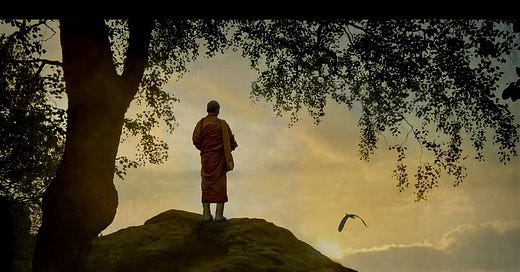Reacting to FC #135, Tarun Kunzru says: “I threw in the towel on my corporate career to pick the gauntlet of Entrepreneurship. I quickly learned that I needed to pick up a towel to dab the stressful sweat of entrepreneurship. In other words, it's a good idea to pick a towel along with the Gauntlet!!!”
Lakshmi Raman, writes: “Early bird that you are, you not only catch the worm but provide people like me with another for the day! It is also nice to know that you have decided to cast your sails to explore new waters later this month. Wish you the very best and may the ink keep flowing for you to continue to delight us, readers!”
On March 28th, 2021, I wrote a short piece on Holi in 🔗FC #39, and it's worth a quick recap. Please read it if you’d like.
.
🌄🌳 Head for the Hills or Take to the Woods?
I celebrated the centenary of FC with an account of my visit to Meghalaya. It was an amazing experience. I gave that travelogue the title ‘Taking to the Hills’. If you haven’t read it, please use this link: 🔗Filter Coffee #100 - by M R Prasanna.
Though “taking to the hills” is somewhat synonymous with “head for the hills”, FC 100 was literally about going to the hills of Meghalaya, and not running away from any problem or a troublesome situation, which was what “head for the hills” typically stands for.
Taking to the woods also means running away or escaping. The difference between these two idioms is not palpable. If I may make a distinction, it would appear to me that when someone takes to the hills that person is unlikely to return, whereas if someone takes to the woods, they may be doing so as a temporary refuge from some problem. But when that issue goes away, they may return, or they are ‘out of the woods’, another idiom, which seems like an antonym for ‘take to the woods’. If readers have a different view, I’m happy to hear it.
Apparently, “make for the hills” was in vogue until about 1950, and it meant the same thing — to run away from something — and “head for the hills”, which was in use since the 1920s, became a more popular idiomatic expression and virtually replaced it.
In our ordinary lives, we find ourselves in situations when we may have to either head for the hills or take to the woods, depending on the situations that we face. As figures of speech, both idioms are relatable to a problematic situation.
Take a simple example. A person has borrowed money and is unable to pay. When the creditor comes knocking on his door, the person hides in one of the rooms and his wife tells the creditor that her husband is not at home. Hiding in the room is nothing but taking to the woods.
Compare this with certain corporate debtors who have fled the country. They have clearly taken to the hills, and the chances of drawing them out have been made formidable by convoluted and complicated extradition laws.
If a corporate is in bad shape and is trying all the means at its disposal and yet is unable to come out of the red, people might say that it is not out of the woods yet. If the situation continues and there are no prospects of recovery, the corporate may take recourse to bankruptcy, which is, in my view, akin to heading to the hills.
It is not always necessary that in order to head to the hills, you must be facing a problem. You may find yourself heading to the hills to avoid or escape from a difficulty. Imagine you know of a person who is suffering from some kind of addiction and is known to borrow, or rather beg, people for money. If you sight him coming your way, you could head to the hills, regardless of the means you adopt to side-step that person.
With some reasoning, one can also realize that there is a spiritual angle to these idioms. We have heard of many people taking to the woods or the hills in pursuit of emancipation from the materialistic and worldly pleasures.
You may have come across the concept of ‘Vipassana’ which means to see things as they really are. It is one of India's most ancient techniques of meditation. It was rediscovered by Gautama Buddha more than 2500 years ago and was taught by him as a universal remedy for universal ills. To go into a silent meditative mode for as long as two weeks.
All the students of vipassana must observe noble silence from the beginning of the course until the morning of the last full day. Noble silence means silence of body, speech, and mind. Any form of communication with a fellow student, whether by gestures, sign language, written notes, etc., is prohibited. Students may communicate with the teacher as needed.
Vipassana is like taking to the hills to do penance. To attain peace of mind, one can head to the hills and not take to the woods, as fear of the wildlife inhibits the desire to be at peace with oneself. This is evident from the fact that vipassana is about introspection and self-realization and self-purification. There’s a center in Igatpuri, Maharashtra where one can enroll in a Vipassana program. For more details please visit 🔗to the Technique and Code of Discipline also see 🔗Igatpuri Vipassana Center (Maharashtra)-Complete Information.
Heading to the hills is also about finding a secure place. The famous poet Rudyard Kipling wrote the poem” The Sea & The Hills”. It is one of the best poems ever written in the English language about the ocean, its dangers, and the pull it exerts over generations of sailors and explorers. He
refers to “she,” the ocean, and to the “hillmen” who desire the calm peace of their “Hills,” a representation of safety and home. If you are a poetry buff and would like to read the poem and know more about it, please use this link 🔗The Sea and the Hills by Rudyard Kipling - Poem Analysis
Ending this post in a lighter vein:
Jack and Jill went up the hill, to file a complaint about the location of the well.
What do you call a world-famous rock group with four guys who don’t sing? Mount Rushmore.
How do you dry a mountain range? With a cliffhanger.
I got lost in the forest, so I have no idea when I would be out of the woods.
Bye readers, take care. See you next week, hopefully :)






As usual well written and enjoyed reading it and many a time had used going to the hills in appropriately . Now I can use these two with a lot better understanding and in the right context . I went to the woods for a couple of years and now may return to a Govt job as my passion for improving the Health Systems in the Govt is not yet fully quenched as there is so much scope for moving from good , better and best systems in the Country or globally before I finally decide to hang my boots and go the hills in the context of accepting any more Government Assignments!☺️
Our ancestors had their own way of 'taking to the woods' at a old age and never to return - 'Vanaprasthashram' was a one way ticket to the woods.. :)